Satisfaction
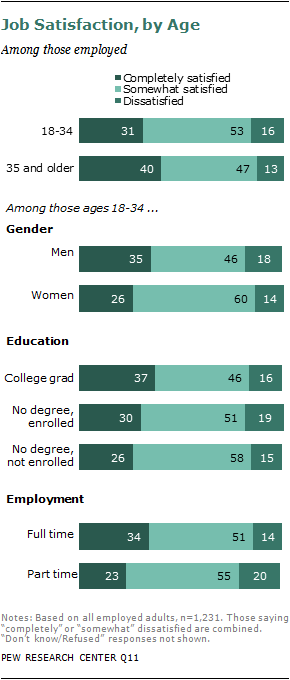
A majority of working adults, regardless of age, say they are either completely or somewhat satisfied with their current job. Younger workers, ages 18 to 34, are a bit less likely than those 35 years and older to say they are completely satisfied; 31% of 18- to 34-year-old workers are completely satisfied, compared with 40% among workers 35 years and older.
Job satisfaction is roughly the same among both younger and older workers today as it was in a 1994 Gallup/CNN/USA Today poll.
Gender differences among younger workers are modest. Younger women are more likely than younger men to describe themselves as “somewhat” satisfied with their job. Younger men are somewhat more likely than their younger women to say they are completely satisfied with their job.
Those with college degrees tend to report higher levels of job satisfaction, but the differences across education groups are modest and do not reach levels of statistical significance.
As expected, young adults with full-time jobs are more likely than those with part-time jobs to be completely satisfied with their work.
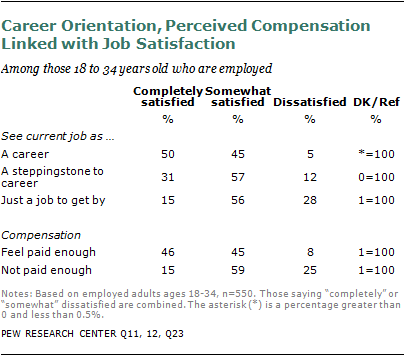
Among older workers, there are no significant differences in job satisfaction levels by gender or full- and part-time employment status.
Career orientation is strongly associated with job satisfaction among both younger and older workers. Those ages 18 to 34 who see their current position as a career are particularly likely to report being completely satisfied with their job—50% say this, compared with 31% among those who see their job as a steppingstone and 15% among those working in a position that is “just a job.”
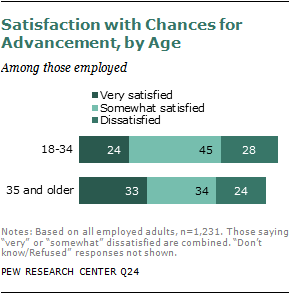
Further, those who think they are paid enough in their job given both the kind and amount of work they do are also more likely than those who feel they don’t get paid enough to report feeling completely satisfied. Among workers ages 18 to 34 who feel they are paid enough, 46% report being completely satisfied in their current position. In contrast, just 15% of younger workers who feel they are not paid enough say they are completely satisfied with their current position.
Outlook for Moving Up
Workers of all ages tend to be at least somewhat satisfied with their chances for career advancement in their present position. Younger workers ages 18 to 34 are less likely than those 35 and older to be “very” satisfied with their chances for advancement. While the youngest workers, ages 18 to 24, are a bit more likely than other young workers to say they are “somewhat” satisfied with their chances for advancement, differences by age in satisfaction levels are modest overall.
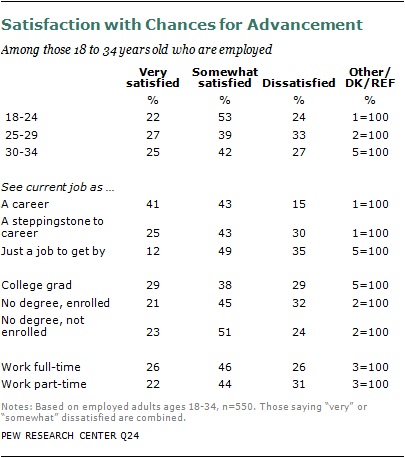
Those who think of their current position as a career tend to be more satisfied with the opportunities for advancement than do those who think of their job as either a steppingstone to a career or as just a job. About four-in-ten (41%) workers ages 18 to 34 who see their position as a career report being very satisfied with their chances for advancement. By contrast, just 12% of younger workers who call their position “just a job” are very satisfied with their chances for advancement. Younger workers who see their current position as a steppingstone fall in the middle between these two groups, with 25% saying they are very satisfied with their chances for advancement.
Younger workers in part-time positions express about the same level of satisfaction with advancement opportunities as do their age-peers working full time, however.
Satisfaction with advancement opportunities does not vary by gender or education levels. Younger male and female workers are about equally likely to say they are satisfied with the opportunities to advance in their position. The same holds among education groups. Younger workers with a college degree are about equally likely as those without a college degree (and not now enrolled in school) to say they are very satisfied with the chances for advancement in their current position. These same patterns hold among older workers.
High Pay vs. Job Security
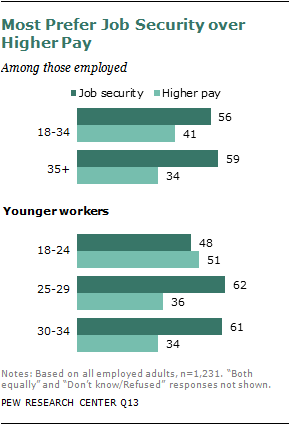
All else being equal, if asked to choose between a job with higher pay or better job security, most employed adults would pick job security. Among younger workers, 56% say they would prefer job security over higher pay (41%). Older workers prefer better job security over higher pay by an even greater margin (59% to 34%).
The youngest workers (ages 18 to 24) are about evenly split between a preference for higher pay (51%) and better job security (48%). This is a marked change from 2009, when this group’s preferences mirrored those of older workers with 61% preferring better job security over higher pay (36%).
Among workers 25 and older, the balance of opinion leans to better job security, with a sizable minority saying they would opt for higher pay.
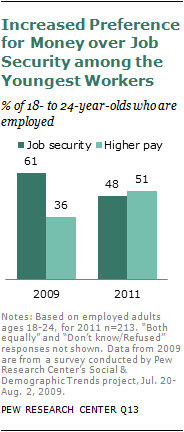
This balance of opinion holds among both younger workers of both genders and for those with either a college degree or who are enrolled in school. Younger workers (18 to 34) with no college degree and who are not currently enrolled tend to be more evenly divided between a preference for higher pay (46%) and a preference for better job security (49%).
How’s the Pay?
Workers’ assessments of their current salary levels are split, with 52% of all workers saying they get paid enough and 46% saying they do not get paid enough, considering the kind and amount of work they do. Younger and older workers hold similar assessments of their compensation levels.
Compared with a 1997 survey conducted on behalf of Wisconsin public television, non-self- employed workers today are more likely to say they are being paid enough, up 11 points for workers 35 and older and up 10 points for workers ages 18 to 34.
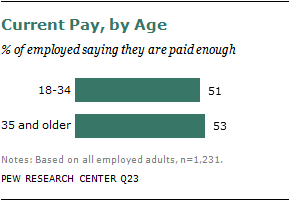
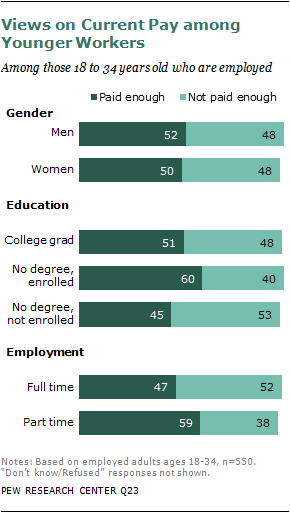
Younger men and women are about equally likely to consider their current pay enough. This is a marked contrast to the pattern among older workers. Men ages 35 and older are more likely than women in this age group to say their current pay is enough (59% of male and 46% of female workers do so).
Younger workers in part-time positions (59%) are more likely than those in full-time positions (47%) to consider their wages enough.
Younger workers who think of their current position as a career are more likely to say they are paid enough; 60% among this group do so, compared with 51% among those who see their position as a steppingstone and 44% who consider it just a job.
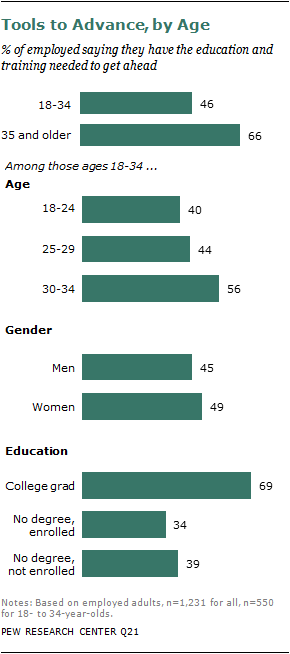
Education is related to views of compensation. Among younger workers, those currently enrolled in school who do not yet have a degree are more likely to consider their pay enough (60%); about half (51%) of college graduates say the same, as do 45% of those without a college degree and not currently enrolled in school.
The Tools to Get Ahead
The Pew Research survey asked for an assessment of whether respondents currently have the necessary training and education to advance in their job or career. About half (52%) of younger workers, ages 18 to 34, say they need more education and training to get ahead in their job or career, and 46% say they have what they need to advance now.
As expected, older workers are more likely to say they already have the training they need. Two-thirds (66%) of workers 35 and older report having the necessary training and education to advance now, and about three-in-ten (32%) say they need more education and training to advance.
These self-assessments are roughly the same as when last asked in 2006 for both younger and older workers, although the gap between young and old has widened somewhat.
Self-assessments of readiness to get ahead tend to vary by age. About four-in-ten (40%) of the youngest workers say they have what they need to advance, as do 44% of those of those 25 to 29 years old. A majority of those (56%) 30 to 34 years old say the same.
Men and women ages 18 to 34 are about equally likely to say they have the education they need to get ahead.
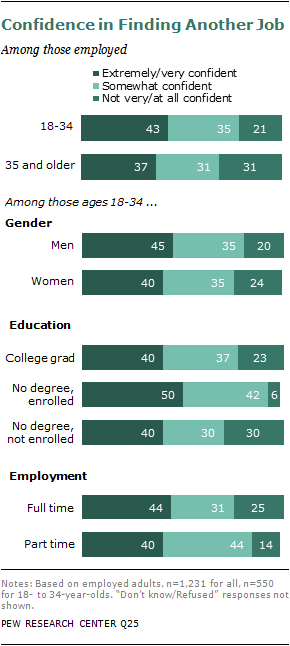
College graduates are much more likely than those with less education to report having the necessary training and education to get ahead in their jobs. About seven-in-ten (69%) younger workers with college degrees report having the necessary training to get ahead, while 31% say they need more. By contrast, a majority of younger workers without a college degree say they need more education and training.
Optimism for Future Job Searches
Workers appear largely optimistic about their own abilities to find another job if the need arises, regardless of age. Among those 18 to 34 years old, about four-in-ten (43%) are extremely or very confident they could find another job as good as or better than their current position, 35% are somewhat confident and about two-in-ten (21%) are not very or not at all confident they could find another job at the same level.
Older workers, ages 35 years and older, also tend to be confident in their ability to find another job. All told, this group is a bit less likely than younger workers to say they are at least somewhat confident in their abilities to find a job at the same level or better.
Younger men and women are about equally confident in their ability to find new work, if needed. Those in part-time jobs are more likely than those in full-time positions to be at least somewhat confident they could find another position.
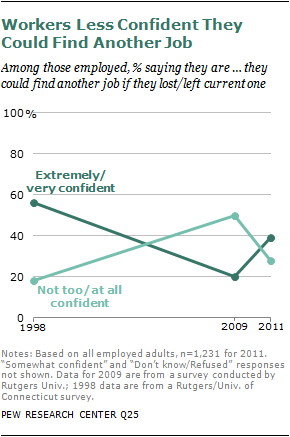
Among those without a college degree, younger workers currently enrolled in school are more likely than other younger workers to be at least somewhat confident in their ability to find a new position if needed.
Confidence in being able to find another job at an equal or better level tends to vary with the broader economic climate. A Rutgers University/ University of Connecticut poll conducted before the economic bust of the late 1990s found both younger and older workers more confident in their ability to find work compared with today, while a survey conducted in 2009 showed a populace considerably less confident than today.
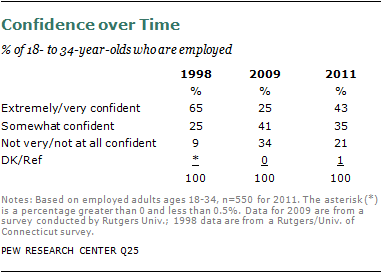
More than six-in-ten workers 18 to 34 years old were very or extremely confident in their ability to find new work in 1998; a quarter (25%) expressed the same level of confidence in 2009. Confidence has partially rebounded today, with 43% of younger workers saying they are very or extremely confident that they could find another job.
Is It a Career…or Just a Job?
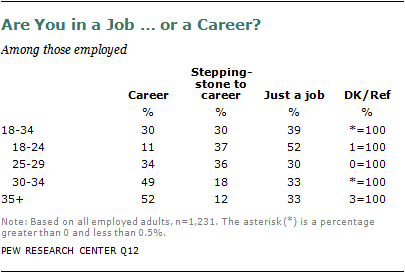
Younger workers have a range of outlooks when it comes to their current employment situation. About four-in-ten (39%) younger workers (ages 18 to 34) say their current position is “just a job,” while three-in-ten call it a career and an equal share call it a “steppingstone to a career.” Among workers ages 35 and older, a similar portion say their current position is just a job (33%), and as would be expected among more established workers, more say their position is a career (52%), with 12% saying their current position is a steppingstone to a career.
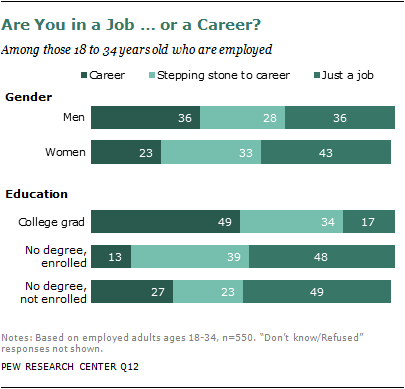
The pattern of responses shows a clear progression with the youngest workers, ages 18 to 24, being the least likely to say they are working in a career position (just 11% do so) and most likely to say their current position is just a job to get by (52%). Those ages 30 to 34 have an orientation toward their current position that is broadly similar to that among older workers; about half of this group (49%) says they are working in a career, 18% says their position is a steppingstone to a career and 33% say it is just a job to get by.
Younger workers, ages 18 to 34, were about equally likely to call their current job a career in 2010 as they do today. However, workers ages 35 and older today are less likely to say their current position is a career, down from 60% in January 2010 to 52% today with a nearly equal rise in the percent calling their position just a job to get by (33% today, up from 27% in 2010).
Younger men are more likely than younger women to see their job as a career position. Upwards of a third of younger men (36%) say their position is a career, compared with 23% among women 18 to 34 years old. This pattern holds among older workers as well.
College education is also strongly associated with a career orientation among both younger and older workers. About half (49%) of those ages 18 to 34 with a college degree say their current position is a career, 34% call it a steppingstone and 17% say it is just a job. This pattern is reversed among those 18 to 34 with no college degree (and who are not currently enrolled in school); 49% say their position is just a job, 27% say it is a career and 23% call it a steppingstone. Younger workers who are currently enrolled in school, but with no college degree, are particularly likely to say their current job is a steppingstone (39% say this), 48% say it is just a job and 13% call it a career.




